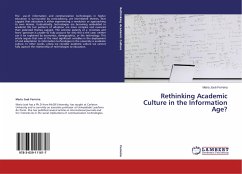The use of information and communication technologies in higher education is surrounded by contradictory, yet interrelated themes, that suggest that education is either experiencing a revolution or approaching its own demise. Undoubtedly, technologies are becoming embedded in academic life but patterns of adoption are more complex and nuanced than polarized themes suggest. The extreme polarity of a 'promises and fears' spectrum is unable to fully account for why this is the case; neither can it be explained by economics, demographics, or the technology. This article argues that one of the most significant variables in the deployment of and adaptation to information technologies in the university is academic culture. In other words, unless we consider academic culture we cannot fully capture the relationship of technologies to education.








